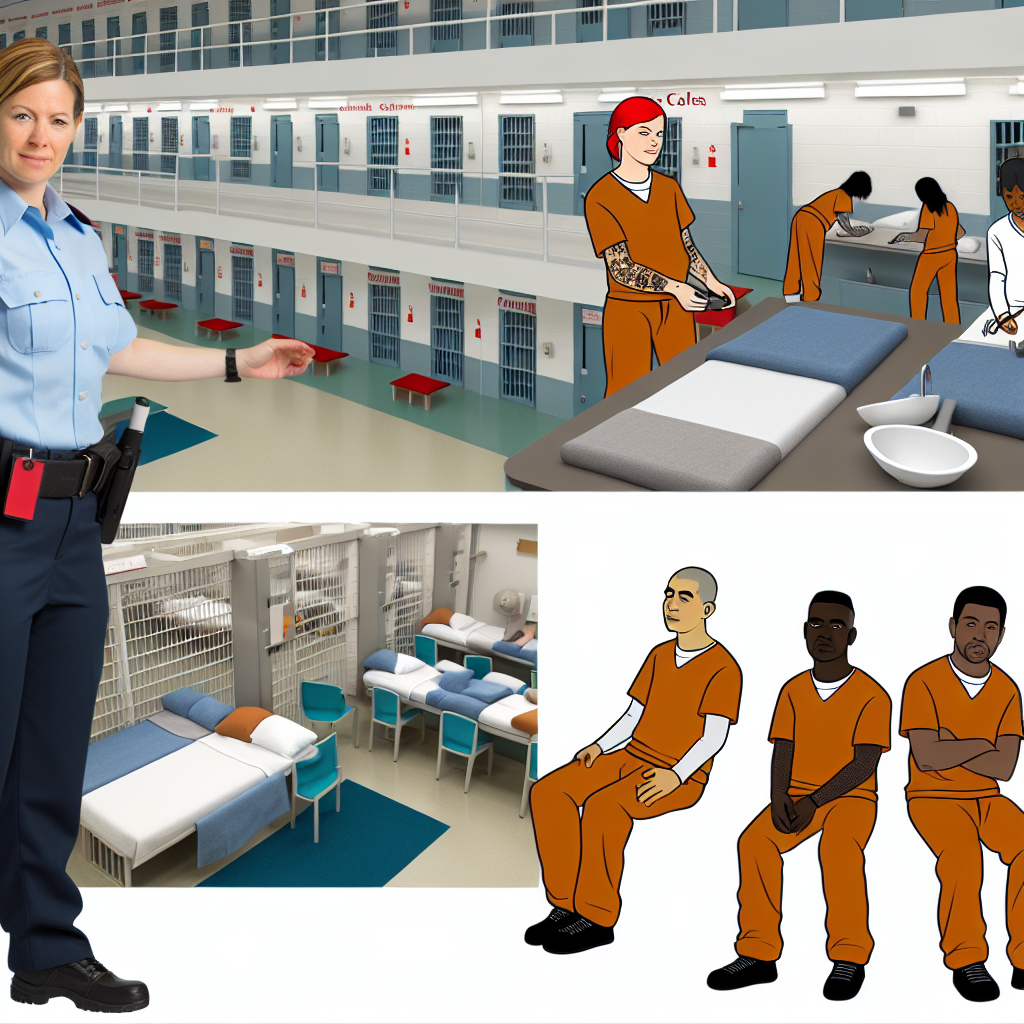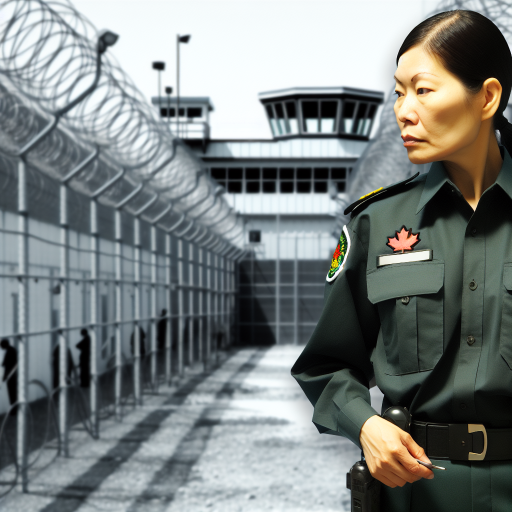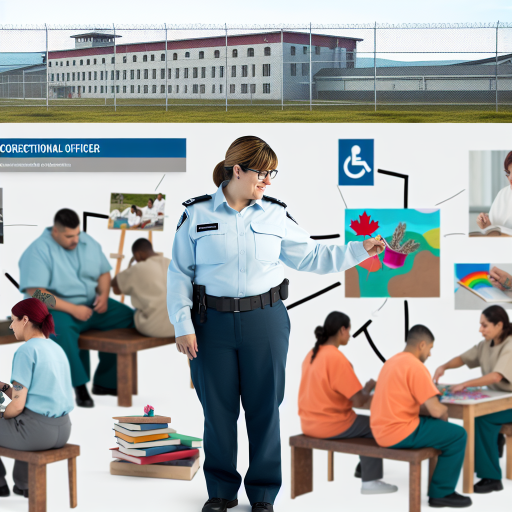Understanding the Role and Responsibilities of a Correctional Officer
Core Responsibilities
A correctional officer oversees inmates in jails and prisons.
The role includes maintaining security and order within facilities.
Officers enforce rules and regulations to prevent disturbances.
They also monitor inmate behavior and provide support for rehabilitation.
Additionally, they conduct searches and inspections for contraband.
Safety Protocols
Safety is a primary concern for correctional officers.
Officers must be trained in conflict resolution techniques.
They frequently assess situations to prevent potential violence.
Quick decision-making is vital in crisis situations.
Furthermore, they collaborate with other law enforcement agencies.
Communication Skills
Effective communication plays a crucial role in this position.
Correctional officers must interact with inmates and staff regularly.
Listening skills help in understanding inmate concerns and grievances.
Moreover, clear communication aids in issuing directives.
Maintaining professionalism fosters respect within the prison environment.
Documentation and Reporting
Accurate documentation of daily activities is essential.
Officers must record incidents and inmate interactions meticulously.
This documentation supports investigations and legal proceedings.
Additionally, they prepare reports for supervisors and management.
Effective reporting ensures accountability and transparency within facilities.
Physical and Mental Demands
The job requires significant physical fitness and stamina.
Officers may need to restrain violent inmates or engage in foot pursuits.
Mental resilience is equally important in this challenging environment.
Officers often deal with high-stress situations and emotional fatigue.
Support programs are available for officers to maintain mental health.
Unlock Your Career Potential
Visualize a clear path to success with our tailored Career Consulting service. Personalized insights in just 1-3 days.
Get StartedEducational Requirements and Recommended Qualifications
General Educational Background
To become a correctional officer in Canada, a high school diploma is essential.
Many employers prefer candidates with post-secondary education.
Degrees in criminology, sociology, or psychology are particularly beneficial.
Additionally, specialized training programs in law enforcement may enhance qualifications.
Specific Training and Certifications
Correctional officers often complete a specific training program upon hiring.
This training covers laws, ethics, and correctional practices.
Many jurisdictions require officers to undergo basic firearms training.
Obtaining certifications in first aid and CPR is also recommended.
Soft Skills and Personal Qualities
Successful correctional officers exhibit strong communication skills.
They must also demonstrate emotional resilience and stability.
Problem-solving abilities are crucial in high-pressure situations.
Additionally, teamwork and collaboration skills enhance effectiveness.
Age and Background Criteria
Most provinces require correctional officers to be at least 18 years old.
A clean criminal record is necessary for employment consideration.
Employers may conduct background checks to verify suitability.
Some jurisdictions may require a psychological evaluation before hiring.
Physical Fitness Standards
Being physically fit is vital for correctional officers.
They must handle physically demanding situations effectively.
Routine fitness evaluations may be part of the hiring process.
Engaging in regular physical training is highly advantageous.
Skills and Attributes Essential for a Successful Career in Corrections
Communication Skills
Effective communication is vital in corrections.
Officers often interact with inmates, colleagues, and the public.
Clear verbal and written skills can prevent misunderstandings.
Moreover, active listening enhances relationships within the facility.
Emotional Stability
Working in corrections demands high emotional resilience.
Officers often face stressful and unpredictable situations.
Emotional stability supports sound decision-making under pressure.
It also helps in maintaining a professional demeanor.
Physical Fitness
Physical fitness plays a crucial role in a correctional officer’s career.
The job may require quick responses and physical intervention.
Regular exercise improves stamina and overall health.
Being fit also contributes to maintaining safety within facilities.
Critical Thinking and Problem-Solving Skills
Correctional officers must think critically at all times.
They need to analyze situations and make prompt decisions.
Problem-solving skills enable officers to handle conflicts effectively.
Furthermore, they often devise strategies to ensure security.
Teamwork and Collaboration
Teamwork is essential in a correctional environment.
Officers work closely with colleagues to maintain order.
Collaboration fosters a supportive work atmosphere.
Moreover, it ensures a unified approach to inmate management.
Respect for Diversity
Understanding and respecting diversity is critical in corrections.
Officers encounter individuals from various backgrounds and cultures.
Cultural awareness helps build trust and rapport with inmates.
Additionally, it fosters a more inclusive environment overall.
Integrity and Ethics
Integrity is a cornerstone of a successful career in corrections.
Officers must uphold high ethical standards in their duties.
Acting honestly promotes public trust and safety.
Moreover, ethical behavior sets a positive example for others.
Learn More: Environmental Officer Contributions to Wildlife Protection
Steps to Obtain Necessary Certifications and Training Programs
Research the Requirements
Start by researching the requirements to become a correctional officer.
Each province in Canada has specific criteria you must meet.
Look for information on the official government websites.
Additionally, reach out to local correctional facilities for advice.
Meet Educational Requirements
Most provinces require a high school diploma or equivalent.
Consider pursuing a college diploma in criminal justice.
This educational background can enhance your employment prospects.
Some candidates may choose to obtain a university degree in related fields.
Complete a Background Check
You must undergo a thorough background check for this position.
This check will assess your criminal record and overall suitability.
Be prepared to provide personal references as part of this process.
Obtain Relevant Certifications
Many provinces require specific training certifications.
First Aid and CPR certification are often mandatory.
Consider enrolling in self-defense training as well.
These certifications can strengthen your application.
Apply for Training Programs
After meeting the initial requirements, apply for training programs.
Programs may be offered by universities, colleges, or correctional institutions.
Look for programs that include hands-on experience and internships.
This practical training is vital for your career development.
Prepare for Physical and Psychological Evaluation
Most correctional officer positions require physical fitness assessments.
Engage in regular physical training to prepare for these evaluations.
Additionally, be ready for psychological testing to evaluate your suitability.
Interview Process
If selected, you will go through an interview process.
Prepare thoroughly by researching common interview questions.
Practice answering questions related to conflict resolution and ethics.
Continuous Education and Training
Once hired, continue your education in the field.
Participate in workshops and additional training sessions.
This ongoing learning helps you stay updated with best practices.
Networking with other professionals can also provide valuable insights.
Discover More: Career Path for Aspiring Correctional Officers in Canada
Applying to Correctional Officer Positions
The Application Steps
The application process for a correctional officer position starts with gathering information.
You should visit the Government of Canada’s job bank for available positions.
Next, prepare a resume that highlights relevant skills and experiences.
Ensure your resume is tailored to the correctional officer role.
In addition, write a strong cover letter that clearly states your interest.
The cover letter should reflect your understanding of the position’s demands.
Submitting Your Application
Your application can be submitted online through the designated portals.
Make sure all required documents are included with your submission.
Double-check for any additional instructions specific to the job posting.
After submitting, keep an eye on your email for communication from the hiring team.
Follow any prompts they provide to ensure a smooth process.
Preparing for the Selection Process
If selected, you will undergo a series of assessments.
These assessments may include psychological evaluations and physical fitness tests.
Moreover, be ready for an extensive background check.
This process is crucial to ensure the safety of the institution.
Therefore, honesty in your application is paramount.
Interview Preparation
Preparing for the interview is vital to your success.
Research common interview questions for correctional officer positions.
Practice your responses with a friend or mentor.
Additionally, be ready to provide examples from your experiences.
Showcase your problem-solving skills and ability to handle conflict.
Post-Application Follow-Up
After your interview, it is appropriate to send a thank-you email.
This gesture demonstrates professionalism and genuine interest.
Additionally, consider following up with the hiring team if you do not hear back.
A polite inquiry shows your continued enthusiasm for the position.
You Might Also Like: Stress Management for Canadian Correctional Officers

Preparing for the Correctional Officer Recruitment Process
Understanding the Role of a Correctional Officer
The role of a correctional officer is critical in maintaining safety and order.
Professionals in this field oversee inmates and ensure adherence to regulations.
Additionally, they handle conflicts that may arise within the facility.
Meeting Basic Requirements
First, applicants must meet specific criteria to qualify.
The minimum age typically required is 18 years old.
Furthermore, candidates must possess a high school diploma or equivalent.
Some provinces may require post-secondary education in related fields.
Preparing for the Application Process
Begin by gathering all necessary documentation.
This may include identification, educational certificates, and employment history.
Next, research the application process for the province you’re applying in.
Each province may have slightly different requirements.
Understanding the Selection Process
The selection process includes several stages that candidates must pass.
Generally, candidates undergo written tests to assess their knowledge and skills.
Afterward, successful candidates may proceed to physical fitness evaluations.
This component tests candidates’ physical capability for the demands of the job.
Preparing for Interviews
Interviews often focus on the candidate’s interpersonal and problem-solving skills.
Prepare by practicing common interview questions and scenarios.
Examples may include conflict resolution and teamwork scenarios.
Demonstrate your understanding of correctional procedures and ethics.
Building Relevant Skills
Consider acquiring skills related to crisis intervention and first aid.
These skills increase your employability in the correctional field.
Additionally, effective communication skills are essential for the role.
Researching the Organization
Familiarize yourself with the correctional service you’ll be applying to.
Understand their mission, values, and the services they provide.
This knowledge demonstrates your commitment and genuine interest during interviews.
Networking and Professional Development
Engage with professionals currently working in correctional services.
Attend workshops, seminars, or community events related to corrections.
Networking can provide valuable insights and career opportunities.
You Might Also Like: Day in the Life of a Canadian Environmental Officer
Challenges and Considerations of Working in Corrections
Emotional and Psychological Stress
The role of a correctional officer is emotionally demanding.
You frequently encounter individuals in crisis situations.
This exposure can lead to stress and burnout over time.
It is essential to develop coping mechanisms.
Support systems, such as counseling, are vital for mental health.
Physical Demands of the Job
Correctional officers must maintain a high level of fitness.
Physical confrontations are a possibility in this role.
Regular training helps prepare officers for these situations.
Staying in shape reduces the risk of injury on the job.
Working Amidst Uncertainty
The work environment in corrections is unpredictable.
Officers must respond quickly to challenging scenarios.
Every shift can bring a new set of challenges.
This unpredictability requires flexibility and quick thinking.
Maintaining Professionalism
Correctional officers must exhibit professionalism at all times.
They interact with individuals from diverse backgrounds.
Showing respect is crucial in maintaining order.
Sometimes, this requires de-escalation techniques.
Training in interpersonal communications can be beneficial.
The Impact on Personal Life
Working in corrections can affect personal relationships.
Shift work may disrupt family time and social activities.
Communicating openly with family members is essential.
Setting boundaries helps maintain a healthy work-life balance.
Career Advancement Opportunities
There are various career paths within the corrections field.
Officers can specialize in areas like rehabilitation or mental health.
Professional development programs are available.
Pursuing additional training can enhance career prospects.
Networking with experienced professionals is also helpful.
Opportunities for Advancement and Career Growth within the Correctional System
Career Ladder in the Correctional System
The correctional system offers a structured career ladder.
Starting as a correctional officer provides a strong foundation.
Dedicated officers can advance to supervisory roles.
After gaining experience, promotion to management positions becomes possible.
Senior management roles include positions like warden and regional director.
Specialized Roles and Training
Specialized roles play a crucial part in career advancement.
Officers can pursue training in areas like counseling and rehabilitation.
Training enhances skills and broadens job opportunities.
Specialized positions include crisis negotiation and behavior management.
Additionally, opportunities in administration and policy development exist.
Networking and Professional Development
Networking is essential for career growth in corrections.
Joining professional associations provides valuable connections.
Associations host conferences and workshops for skill enhancement.
Engaging with mentors offers guidance and insight into career paths.
Continuous education helps officers stay updated with best practices.
Workplace Support and Resources
Correctional facilities often provide support for career development.
Many institutions offer tuition reimbursement for further education.
This support encourages ongoing professional development.
Access to training programs improves an officer’s skill set.
Workshops on leadership and team-building are also available.
Impact of Experience on Career Growth
Experience plays a significant role in career advancement.
Officers with varied experiences often move up faster.
Working in specialized units can accelerate this process.
Long-term employees bring valuable insights that organizations appreciate.
Furthermore, seasoned officers can mentor new recruits.
Additional Resources
Become a correctional officer | ontario.ca
Welcome to the Public Service Pension plan – Pension Services …




